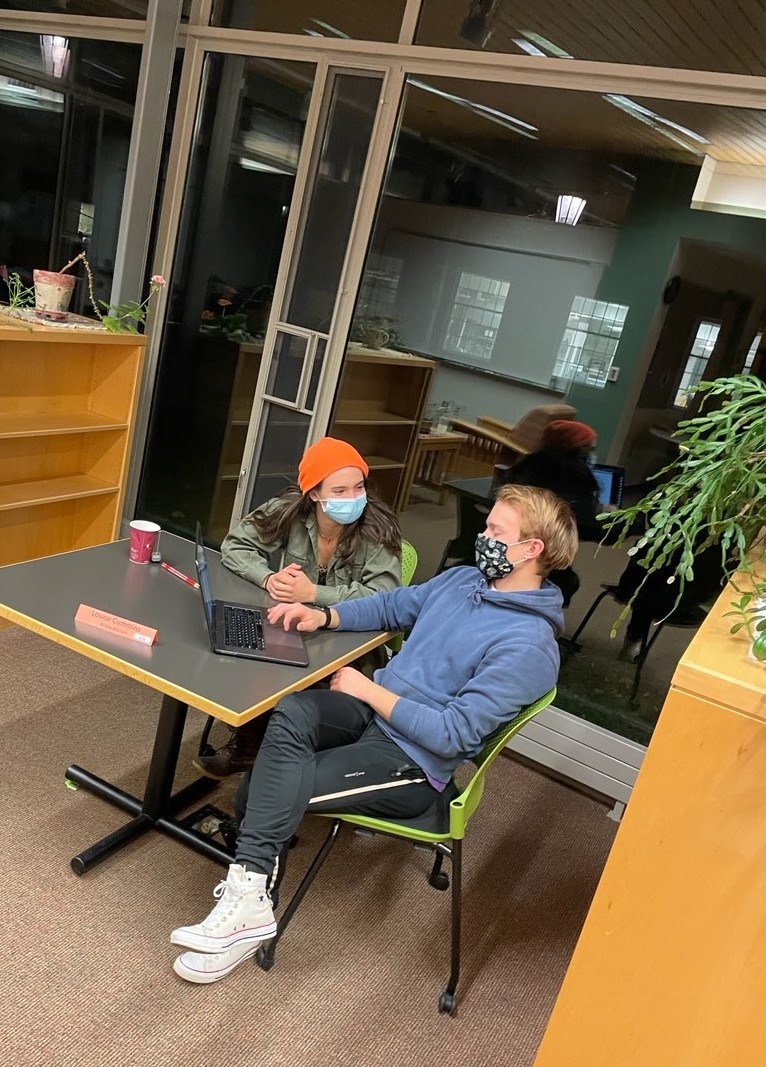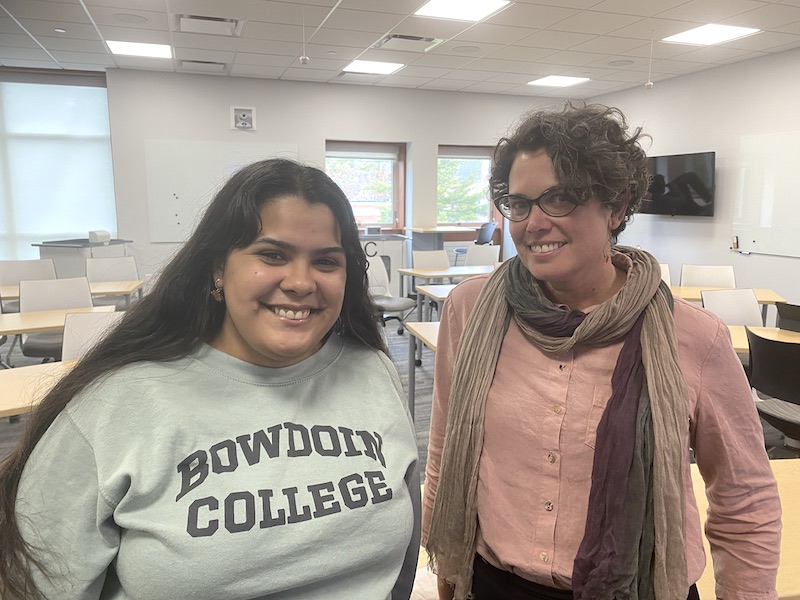Momentum: Bowdoin's Writing Center Sees Growing Numbers of Students
By Rebecca Goldfine
Right from the start of the semester, the Writing Center—which is part of Baldwin Center for Learning and Teaching—was prepared for a full schedule. By the end of September, 154 students had made a total of 211 writing appointments—almost double the 121 appointments made by 86 students in the autumn of 2018.
While the start of the semester is often the busiest time, interest in the center stayed strong throughout the fall.
There are likely several reasons for the growing popularity of the Writing Center, including its emphasis on fostering a collaborative, accepting environment where students from different backgrounds feel comfortable.
Katie Byrnes, the director of the Baldwin Center, says the uptick could also be due to students returning from a year and a half of remote learning. "They may be primed to take advantage of resources available because it's been so hard studying remotely and being on their own. They're much more likely to meet with someone to work on papers, or to meet with someone to work on improving a skill."
Writing assistant Elise Hocking ’22 also wonders whether the pandemic has helped boost numbers. "Last year, many people felt disconnected academically and socially, and I think the Writing Center builds connections," she said. The writing process can be both isolating and stressful, she added, and checking in with someone while working on a paper can be reassuring and validating.
"Writing is a social process," Hocking said. "And I think the Writing Center highlights that for people."
Additionally, Byrnes attributes the rising demand for writing assistants to word of mouth. With increasing numbers of students using the Baldwin Center's resources each year, more are reporting positive experiences to friends and classmates, she said.
But another crucial piece to the Writing Center's popularity is due to its director, Meredith McCarroll, who has restructured the program to ensure diversity, equity, and inclusion. McCarroll is Bowdoin's director of writing and rhetoric, director of the first-year writing seminar program, and a lecturer in English.
Her work in this area was recently recognized by the Small Liberal Arts Colleges–Writing Program Administrators, which awarded her the 2021 Martinson Award for Innovation, citing the anti-racist framework she has established for Bowdoin's writing program.
Linguistic Justice and Anti-Racism
A couple of years ago, after noting that many writing assistants were white and graduates of private high schools, McCarroll began implementing a number of changes to the program. One was shifting the hiring process to open the field to more candidates beyond students recommended by professors. References were expanded, as well, to include staff and peers.
She also revised the application, including asking a question about a time applicants had encountered challenges with their writing. "People who have struggled with writing are more natural writing assistants," she said.
And by removing name and demographic information from the applications, McCarroll and the hiring committee could also evaluate candidates without possible implicit bias.
Since establishing these new protocols, the pool of writing assistants has become more diverse. In turn, the writing assistants are drawing in more students. "When you walk into a space like the Writing Center and you see yourself reflected back, you feel welcome," McCarroll said.
To underscore these changes, McCarroll makes social justice a key theme in the spring-semester class she teaches to all writing assistants, who are required to take her Theory and Practice of Tutoring Writing course. The class covers strategies about collaborative learning, linguistic diversity, and developing a writing voice.
"A big part of the training course is around linguistic justice," McCarroll said, "which is the idea that we imagine standard English or academic English as normal. Instead, in the class we focus on how standard or academic English is the language you need to use in some settings. But it is not natural; it is a constructed language that people use in certain spaces."
This education translates to writing assistants communicating to their peers that while academic English "is a right way to speak, so too is the way you speak with your family—that there are different contexts for different ways of speaking, and that power dynamics have normalized certain ways of speaking over others," McCarroll said.
Louise Cummins ’23 is a writing assistant and a theater and dance major and English minor. She said she finds the center's environment to be "collaborative and creative," much like other spaces she's experienced and appreciated at Bowdoin.
She also embraces the Writing Center's approach to language, pointing to her Southern roots (she is from Hendersonville, North Carolina). "It sucks that there are expectations placed on writing to sound a certain way. It seems there are layers in that kind of writing to keep you from even understanding yourself!" she said. "So having a space and people here who can validate your ideas and help you draw them out and find a way to express them clearly in your own voice, or a voice you choose to harness, is important."


